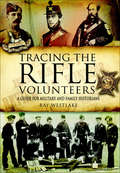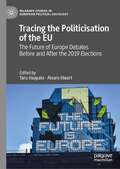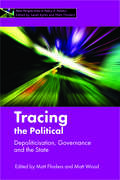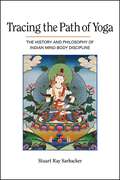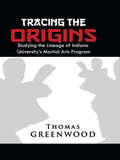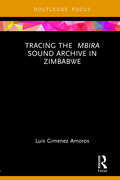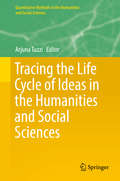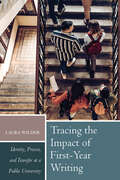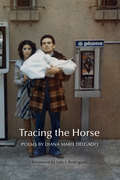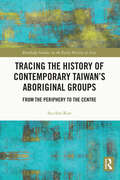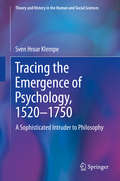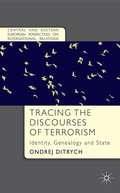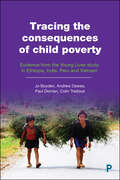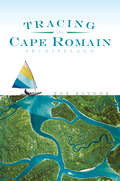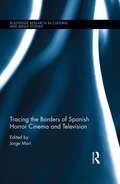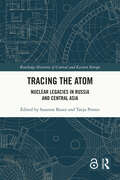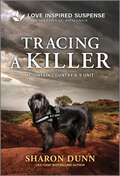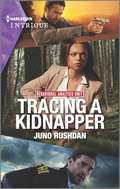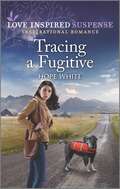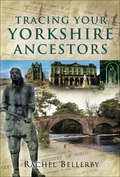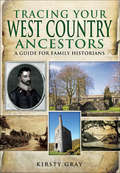- Table View
- List View
Tracing the Rifle Volunteers: A Guide for Military and Family Historians
by Ray WestlakeFrom 1859 to 1908 the Rifle Volunteers played an essential role in Britains national defence, yet their history has been sadly neglected. Little information is available on these dedicated, amateur soldiers who were recruited into the ranks of a military organization that flourished across the country. But now, in this invaluable book, Ray Westlake, a leading authority on the military history of Victorian and Edwardian Britain, provides a concise, accessible introduction to the Rifle Volunteers and a comprehensive directory of the units raised in each county and each town.
Tracing the Politicisation of the EU: The Future of Europe Debates Before and After the 2019 Elections (Palgrave Studies in European Political Sociology)
by Taru Haapala Álvaro OleartDeparting from the idea that political controversies are embedded in the very framework of European integration, this volume focuses on the relationship between politicisation and European democracy. The contributors to this edited volume trace the various ways of understanding ‘politicisation’ before and beyond the 2019 European elections. The aim is to offer constructive reinterpretations of the concept for further research in the field. Encompassing different approaches, the book shows a plurality of perspectives and provides innovative analytical tools to make sense of the phenomenon of politicisation in the EU context. Assuming that EU politicisation can be seen both as vice and virtue depending on the way in which it takes place, the authors analyse under what conditions it has a positive or negative influence over European democracy. Emphasising that scholars ought to be aware of the normative assumptions underlying the conceptualisation of politicisation, the book illustrates how many of the features in European politics that were intensified during the Covid-19 pandemic were already present earlier. Tracing the Politicisation of the EU will be of interest to students and scholars in EU Studies, Comparative Politics, Media and Communication, Political Theory and Political Sociology.
Tracing the Political: Depoliticisation, Governance and the State (New Perspectives in Policy and Politics)
by Edited by Matthew Flinders and Matt WoodOver the past two decades politicians have delegated many political decisions to expert agencies or ‘quangos’, and portrayed the associated issues, like monetary or drug policy, as technocratic or managerial. At the same time an increasing number of important political decisions are being removed from democratic public debate altogether, leading many commentators to argue that they are part of a ‘crisis of democracy’, marking the ‘end of politics’. Tracing the political uses a broad range of international case studies to chart the politicising and depoliticising dynamics that shape debates about the future of governance and the liberal democratic state. The book is part of the New perspectives in policy and politics series, and will be an important text for students of politics and policy, as well as researchers and policy makers.
Tracing the Path of Yoga: The History and Philosophy of Indian Mind-Body Discipline
by Stuart Ray SarbackerClear, accessible, and meticulously annotated, Tracing the Path of Yoga offers a comprehensive survey of the history and philosophy of yoga that will be invaluable to both specialists and to nonspecialists seeking a deeper understanding of this fascinating subject. Stuart Ray Sarbacker argues that yoga can be understood first and foremost as a discipline of mind and body that is represented in its narrative and philosophical literature as resulting in both numinous and cessative accomplishments that correspond, respectively, to the attainment of this-worldly power and otherworldly liberation. Sarbacker demonstrates how the yogic quest for perfection as such is situated within the concrete realities of human life, intersecting with issues of politics, economics, class, gender, and sexuality, as well as reflecting larger Indic religious and philosophical ideals.
Tracing the Origins: Studying the Lineage of Indiana University’s Martial Arts Program
by Thomas GreenwoodTracing the Origins is a book in three parts. The first is a personal history of the author as it relates to martial arts. The second is an ethnographical study of the authors martial lineage and more importantly the ways in which lineage functions. Lastly are the transcriptions of the interviews the author conducted in pursuit of this work. Tracing the Origins should prove especially interesting to those interested in the field of ethnography as it relates to martial arts and lineage.
Tracing the Mbira Sound Archive in Zimbabwe
by Luis Gimenez AmorosTracing the Mbira Sound Archive in Zimbabwe analyses the revitalisation and repatriation of historical recordings from the largest sound archive in Africa, the International Library of African Music (ILAM). It provides a postcolonial study on the African sound archive divided into three historical periods: the colonial period offers a critical analysis on how ILAM classifies its music through ethnic and linguistic groups; the postcolonial period reconsiders postcolonial nationhood, new/old mobility and cultural border crossing in present Africa; and the recent period of repatriation focuses on the author’s revitalisation of the sound archive. The main goal of this study is to reconsider the colonial demarcations of southern African mbira music provided by the International Library of African Music (ILAM). These mbira recordings reveal that the harmonic system used in different lamellophones (or mbiras) in southern Africa is musically related. The analysis of sound archives in Africa is an essential tool to envision the new ways in which African culture can be directed not only from postcolonial notions of nationhood or Afrocentric discourses but also for the necessity of bringing awareness of the circulation of musical cultures from and beyond colonial African borders.
Tracing the Life Cycle of Ideas in the Humanities and Social Sciences: A Portrait Of A Discipline Through Analyses Of Scientific Literature (Quantitative Methods in the Humanities and Social Sciences)
by Arjuna TuzziThis book demonstrates how quantitative methods for text analysis can successfully combine with qualitative methods in the study of different disciplines of the Humanities and Social Sciences (HSS). The book focuses on learning about the evolution of ideas of HSS disciplines through a distant reading of the contents conveyed by scientific literature, in order to retrieve the most relevant topics being debated over time. Quantitative methods, statistical techniques and software packages are used to identify and study the main subject matters of a discipline from raw textual data, both in the past and today. The book also deals with the concept of quality of life of words and aims to foster a discussion about the life cycle of scientific ideas. Textual data retrieved from large corpora pose interesting challenges for any data analysis method and today represent a growing area of research in many fields. New problems emerge from the growing availability of large databases and new methods are needed to retrieve significant information from those large information sources. This book can be used to explain how quantitative methods can be part of the research instrumentation and the "toolbox" of scholars of Humanities and Social Sciences. The book contains numerous examples and a description of the main methods in use, with references to literature and available software. Most of the chapters of the book have been written in a non-technical language for HSS researchers without mathematical, computer or statistical backgrounds.
Tracing the Impact of First-Year Writing: Identity, Process, and Transfer at a Public University
by Laura WilderTracing the Impact of First-Year Writing presents the results of a large-scale longitudinal study of college writers that explores the impact of a required first-year writing course with a comparative approach not previously available. Over five years Laura Wilder conducted 143 interviews with, and collected 774 pages of writing from, 58 students, half of whom had taken a new first-year writing course and half who had not. Wilder found that while in many ways the experiences of both groups are comparable—demonstrating how students receive valuable educations in rhetoric and writing from a variety of sources beyond a first-year writing course—students who took the first-year writing course were much more likely to identify as writers. This identification supported students’ use of writing in powerfully generative and knowledge-building ways that they carried with them long after the course into other appropriate contexts. In contrast to previous longitudinal studies of college writers undertaken at institutions with high prestige and resources, Tracing the Impact of First-Year Writing explores the role of writing at a regional public university and documents how students’ experiences with writing can be highly divergent across the curriculum and unequal across campuses. Additionally, this book includes the voices of students who do not identify as capable writers and have strongly negative emotional reactions to writing and writing instruction and adds empirical support to innovative calls in the field to transform the first-year writing course into one that inspires students to reflectively consider writing itself.
Tracing the Horse: A Suburban Bestiary (New Poets of America #43)
by Diana Marie DelgadoSet in Southern California's San Gabriel Valley, Diana Marie Delgado’s debut poetry collection follows the coming-of-age of a young Mexican-American woman trying to make sense of who she is amidst a family and community weighted by violence and addiction. With bracing vulnerability, the collection chronicles the effects of her father’s drug use and her brother’s incarceration, asking the reader to consider reclamation and the power of the self.
Tracing the History of Contemporary Taiwan’s Aboriginal Groups: From the Periphery to the Centre (Routledge Studies in the Early History of Asia)
by Su-Chiu KuoUsing archaeological evidence, the author investigates the prehistories of Austronesian migrants to Taiwan and their connections to contemporary peoples in Taiwan. Due to its unique geographic location, Taiwan has played a significant role in various peoples’ maritime migrations and the process of cultural interactions for tens of thousands of years. Within the history of humankind, Taiwan has also evidenced a high degree of cultural continuity. Paleolithic people had already settled on the island at least 30,000 years ago, but Taiwan only entered the historical period as recently as the 17th century. Before this, there was a long and continuous development over the prehistoric period. To this day there are at least 20 different indigenous ethnic groups on the island, totalling over half a million people, all of whom speak Austronesian languages. Investigating the archaeology of abandoned villages, Kuo takes the Paiwan and Sanhe cultures as key case studies of these groups. This book provides valuable insight for historians and archaeologists of Taiwan, and scholars of prehistoric Austronesian migration.
Tracing the Emergence of Psychology, 1520–1750: A Sophisticated Intruder to Philosophy (Theory and History in the Human and Social Sciences)
by Sven Hroar KlempeThis book pursues the very first use of the term “psychology”, which is traced back to 1520. The appearance of the term was not as a part of philosophy. Thus, the main hypothesis of this book is that psychology from the very beginning was a stranger to philosophy. It demonstrates that even Aristotle used his thesis on the soul to delineate philosophy from psychological aspects. It is therefore suggested that psychological wisdom and knowledge has been retained and in popular culture as long as humans have reflected upon themselves. There were, however, several reasons for why psychology appeared as a part of philosophy at around the year 1600. One important factor was Humanism, which among other things had challenged Aristotelian logic. Another important movement was Protestantism. Luther’s emphasis on the need to confess one’s sin, led to a certain interest to explore the human nature. His slogan, “the scripture alone” represented an attack on the close relationship that had existed between theology and philosophy. Yet when philosophy was thrown out of theology, it was left without the basic theological tenets that had guided philosophical speculations for centuries in Europe. Hence, this book pursues how philosophy gradually adopts and includes psychological aspects to rebuild the foundation for philosophy. This culminates partly with the British empiricists. Yet they did not apply the term psychology. It was the German and partly ignored philosopher Christian Wolff, who opened up modern understanding of psychology with the publication of Psychologia empirica in 1732. This publication had a tremendous impact on the enlightenment in the modern Europe.
Tracing the Discourses of Terrorism
by Ondrej DitrychThis unique, historical study explores how states have articulated statements about terrorism since the 1930s and what effect these discourses have had on global politics. Ditrych's analysis challenges established understandings of terrorism, providing a new conceptualization of how terrorism discourse emerged historically.
Tracing the Consequences of Child Poverty: Evidence from the Young Lives study in Ethiopia, India, Peru and Vietnam
by Jo Boyden Andrew DawesAvailable Open Access under CC-BY-NC licence. What matters most in how poverty shapes children’s wellbeing and development? How can data inform social policy and practice approaches to improving the outcomes for poorer children? Using life course analysis from the Young Lives study of 12,000 children growing up in Ethiopia, India, Peru and Vietnam over the past 15 years, this book draws on evidence on two cohorts of children, from 1 to 15 and from 8 to 22. It examines how poverty affects children’s development in low and middle income countries, and how policy has been used to improve their lives, then goes on to show when key developmental differences occur. It uses new evidence to develop a framework of what matters most and when and outlines effective policy approaches to inform the no-one left behind Sustainable Development Goal agenda.
Tracing the Cape Romain Archipelago (Natural History)
by Bob RaynorBetween Myrtle Beach and Charleston lies the Cape Romain archipelago, which links with adjoining barrier islands to form a section of pristine, protected coast designated as a UNESCO Biosphere Reserve. Local sailing enthusiast Bob Raynor, author of Exploring Bull Island, spent years weaving through the archipelago in his silent sailboat, Kingfisher. On his many forays through the wild territory, he encountered diverse and abundant wildlife, Native American shell middens, storms, conservation efforts and plenty of cultural and natural history. His captivating, firsthand descriptions of the area, which is under threat from coastal development, offer a priceless glimpse into one of South Carolina’s most important natural treasures.
Tracing the Borders of Spanish Horror Cinema and Television (Routledge Research in Cultural and Media Studies)
by Jorge MaríThis critical anthology sets out to explore the boom that horror cinema and TV productions have experienced in Spain in the past two decades. It uses a range of critical and theoretical perspectives to examine a broad variety of films and filmmakers, such as works by Alejandro Amenábar, Álex de la Iglesia, Pedro Almodóvar, Guillermo del Toro, Juan Antonio Bayona, and Jaume Balagueró and Paco Plaza. The volume revolves around a set of fundamental questions: What are the causes for this new Spanish horror-mania? What cultural anxieties and desires, ideological motives and practical interests may be behind such boom? Is there anything specifically "Spanish" about the Spanish horror film and TV productions, any distinctive traits different from Hollywood and other European models that may be associated to the particular political, social, economic or cultural circumstances of contemporary Spain?
Tracing the Atom: Nuclear Legacies in Russia and Central Asia (Routledge Histories of Central and Eastern Europe)
by Susanne BauerThis book is about nuclear legacies in Russia and Central Asia, focusing on selected sites of the Soviet atomic program, many of which have remained understudied. Nuclear operations, for energy or military purposes, demanded a vast infrastructure of production and supply chains that have transformed entire regions. In following the material traces of the atomic programs, contributors pay particular attention to memory practices and memorialization concerning nuclear legacies. Tracing the Atom foregrounds historical and contemporary engagements with nuclear politics: How have institutions and governments responded to the legacies of the atomic era? How do communities and artists articulate concerns over radioactive matters? What was the role of radiation expertise in a broader Soviet and international context of the Cold War? Examining nuclear legacies together with past atomic futures and post-Soviet memory and nuclear heritage, sheds light on how modes of knowing intersect with livelihoods, compensation policies, and historiography. Bringing together a range of disciplines – history, science and technology studies, social anthropology, literary studies, and art history – this volume offers insights that broaden our understanding of 20th century atomic programs and their long aftermaths.
Tracing the Connected Narrative
by Janice CavellBy the 1850s, journalists and readers alike perceived Britain's search for the Northwest Passage as an ongoing story in the literary sense. Because this 'story' appeared, like so many nineteenth-century novels, in a series of installments in periodicals and reviews, it gained an appeal similar to that of fiction. Tracing the Connected Narrative examines written representations of nineteenth-century British expeditions to the Canadian Arctic. It places Arctic narratives in the broader context of the print culture of their time, especially periodical literature, which played an important role in shaping the public's understanding of Arctic exploration.Janice Cavell uncovers similarities between the presentation of exploration reports in periodicals and the serialized fiction that, she argues, predisposed readers to take an interest in the prolonged quest for the Northwest Passage. Cavell examines the same parallel in relation to the famous disappearance and subsequent search for the Franklin expedition. After the fate of Sir John Franklin had finally been revealed, the Illustrated London News printed a list of earlier articles on the missing expedition, suggesting that the public might wish to re-read them in order to 'trace the connected narrative' of this chapter in the Arctic story. Through extensive research and reference to new archival material, Cavell undertakes this task and, in the process, recaptures and examines the experience of nineteenth-century readers.
Tracing a Killer (Mountain Country K-9 Unit #7)
by Sharon DunnA K-9 team in the crosshairs— and seeking justice. While tasked with protecting Trevor Gage from a serial killer, K-9 officer Hannah Scott inadvertently puts a second cold case murderer on their trail. The man who drowned Hannah&’s childhood friend is back—and he wants to make Hannah his next victim. Guarding Trevor becomes a survival mission once they both become the target of ruthless criminals. On a remote island with only each other to rely on, there&’s nowhere to run. And with twice the deadly traps, any misstep could prove fatal.From Love Inspired Suspense: Courage. Danger. Faith.Mountain Country K-9 Unit Book 1: Baby Protection Mission by Laura ScottBook 2: Her Duty Bound Defender by Sharee StoverBook 3: Chasing Justice by Valerie HansenBook 4: Crime Scene Secrets by Maggie K. BlackBook 5: Montana Abduction Rescue by Jodie BaileyBook 6: Trail of Threats by Jessica R. PatchBook 7: Tracing a Killer by Sharon DunnBook 8: Search and Detect by Terri Reed
Tracing a Kidnapper (Behavioral Analysis Unit #3)
by Juno RushdanRescuing children is her life&’s mission.Saving this one is paramount. FBI agent Madeline Striker&’s new case feels deeply personal. The kidnapped daughter of tech CEO Jackson Rhodes is the same age her sister was when she was abducted. The kidnap specialist&’s fierce determination to rescue Jackson&’s child forges a powerful bond between them, but they can&’t allow their intense attraction to divert their focus. Because a vindictive enemy is threatening the child&’s life.From Harlequin Intrigue: Seek thrills. Solve crimes. Justice served.Discover more action-packed stories in the Behavioral Analysis Unit series. All books are stand-alone with uplifting endings but were published in the following order: Book 1: Profiling a Killer by Nichole SevernBook 2: Decoding a Criminal by Barb HanBook 3: Tracing a Kidnapper by Juno RushdanBook 4: Trapping a Terrorist by Caridad Piñeiro
Tracing a Fugitive (Boulder Creek Ranch #2)
by Hope WhiteRescuing a stranger… Could get her killed. Discovering a wounded man on a mountain trail, Rose Rogers and her precocious search and rescue dog, Oscar, must get him to safety—especially when bullets start flying their way. Only, guarding army veteran Noah Greene from the hidden gunmen lands her right in the middle of a manhunt. With targets now on both of their backs, outrunning danger could be beyond their reach. From Love Inspired Suspense: Courage. Danger. Faith. A BOULDER CREEK RANCH NOVEL Book 1: Wilderness HideoutBook 2: Tracing a Fugitive
Tracing Your Yorkshire Ancestors: A Guide For Family Historians - Second Edition (Tracing Your Ancestors)
by Rachel BellerbyIf you want to find out about your Yorkshire ancestors, you can visit the many unusual and fascinating archives in England's largest county. As well as tracing when your ancestors were born, married and died, you can explore how they lived, how they spent their leisure time and what their home life was like. Rachel Bellerby's invaluable guide will introduce you to places that hold a wealth of information about Yorkshire's past, and the records you find in these archives will bring your research to life. Whatever you wouldlike to discover more about, from fairground travellers to Romany gypsies, from working deep underground in a mine to making a living from the North Sea, there is so much to learn. The many different archives that welcome family history researchers are explored here and explained. Often these archives are overlooked, yet they contain revealing information about the people who called Yorkshire their home. Dozens of places, from tiny museum archives to large research centres, are open for your research. Tracing your Yorkshire ancestors has never been more exciting.
Tracing Your West Country Ancestors: A Guide For Family Historians (Tracing Your Ancestors)
by Kirsty GrayThis book is an essential handbook for those researching their ancestry in the counties of Cornwall, Devon and Somerset and the city of Bristol. It begins with an introduction to the identity of The West Country, its geography and history over the centuries. It then guides family historians through the wealth of historical records available both online and in archives and libraries in order to add the flesh to the bones of the names of ancestors on their family trees.West Country expert Kirsty Gray highlights fascinating details that can be uncovered about the places where our ancestors lived, their occupations and the distinctive features, identity and character of the West Country itself. She provides case studies of some notable individuals from the counties as well as records of those individuals who never hit the headlines.This practical and informative guide is a must have for readers wishing to find out more about all aspects of life in this area of England.
